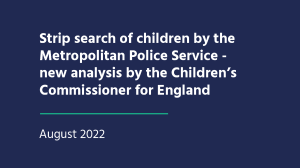I was appalled and shocked to read the Serious Case Review relating to Child Q, which found the system designed to protect and support her had seriously failed. The Metropolitan Police has committed to learning lessons from this incident but the value in lessons being learnt comes from them not being repeated. That’s what sorry means, it means it won’t happen again. Child Q has been very strong and brave in using her experience to demand changes within the Metropolitan Police. It is beholden on all of us in positions of power and influence to respond to that call.
Today, I am publishing Metropolitan Police data that I requested using my powers under the Children and Families Act 2014. It details the practice regarding the strip searching of children during stop and searches between 2018 and 2020 (with some limited data for 2021). Half of all strip searches of children resulted in no further action taken, which calls into question whether these intrusive and traumatising searches were necessary at all.
Between 2018 and 2020, 650 children were strip searched – at a rate of nearly one a day in 2020. In some cases, these were children as young as 10 years old – a quarter of children searched were aged 15 or under.
Under police guidance, an Appropriate Adult should be present if a child is strip searched (for example, a parent, social worker, or volunteer). The data showed that an Appropriate Adult was not present on almost a quarter (23%) of all occasions when the Metropolitan Police strip searched children between 2018 and 2020.
I was also shocked, but sadly not surprised after the experiences of Child Q, to learn that of all boys who were strip searched, 58% were Black, as described by the officer.
53% of all strip searches of children resulted in no further action taken, which calls into question how justified these intrusive and traumatising searches were.
Finally, the data is concerningly poor on where children were strip searched. Of the searches in 2021 for which I have been provided information, most searches happened at a police station, or in a child’s own home, but one in five searches happened at an ‘other location’. While the Police do not consider that any strip searches of a child happened at a school in 2021, I am concerned that poor data collection demonstrates a lack of appropriate oversight of police practice in the strip searching of children.
You can read the full report here.
In light of these findings, I am not reassured that what happened to Child Q was an isolated issue, though it was certainly rare and the context unique. Instead, I believe it indicates more systemic problems around child protection. I remain unconvinced that the Metropolitan Police is consistently considering children’s welfare and wellbeing.
A police power that is as intrusive and traumatic for children as a strip search must be treated with the utmost care and responsibility. It must also be accompanied by a robust and transparent system of scrutiny to protect and safeguard vulnerable children. Practice in this area is not currently consistent across England.
I will be continuing to focus on this issue. I am keen to work with the Metropolitan Police and the incoming Metropolitan Police Commissioner to improve practice in London. I will also be replicating this analysis by requesting data from all police forces in England, and will be engaging with the national policy framework for police strip searches to ensure that children are properly safeguarded and that searches are only ever undertaken where there is immediate risk of harm to the child themselves or someone else.
I will continue to work to ensure that strip searching is only undertaken when absolutely justified, and that appropriate safeguards are in place to protect children, and to ensure that they are fully supported and cared for after a search has taken place.
I will close with the voices of some of the half a million children that I heard from in The Big Ask, the largest-ever survey of children that I conducted last year.
“…When it comes to policing well the statistic show black people are 9x more likely to be stopped and searched than their white counterparts! Why is this happening? We all know why, it’s because of racism… So that’s the first thing that’s stopping me, being perceived as a criminal.”– Girl, aged 15.
“In certain areas, there is heavy youth crime, where I live there’s youth violence happening every single day, what stops young people in England from achieving is because the government don’t put enough money into dangerous areas like ours. The government need to invest heavily to stop knife crime and gun crime from the root of the problem, stop and search simply won’t work well for starters we need more youth clubs where kids can go instead of going to the streets.” – Boy, aged 15.
These powerful accounts demonstrate that not only do we need to ensure that the police take seriously their responsibility to safeguard all children, but that there is a need for a wider focus on children’s relationship with the police and how issues like gang violence and criminal exploitation should be tackled.






